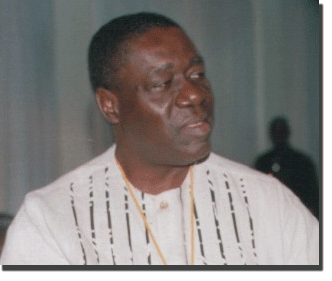 |
 |
| Chairman Gyude Bryant |
Vice Chairman Wesley Johnson |
Another page in Liberia’s checkered 156 years history has been writing
on October 14th with the induction of Charles Gyude Bryant and Wesley Momo
Johnson as Chairman and Vice Chairman respectively of the in new National
Transitional Government of Liberia (NTGL).
Messrs. Bryant and Johnson are took over from interim President Moses Z. Blah
and recent inducted vice president John Gray who have been steering the affairs
of state since the departure of former president Charles Ghankay Taylor on
August 11, 2003.
This unusual political arrangement is the fourth of its kind in Liberia’s
history aimed at bringing lasting peace to the country after several years
of senseless fratricidal wars.
The first, though different from what is obtaining this time around, took
place following the UN-sponsored conference in Geneva, Switzerland in July
1993 and later transferred to Cotonou, Benin, where the Cotonou Agreement
evolved (followed by two other Cotonou Conferences) which produced a coalition
transitional government that included a 5-member Council of State, a 35-member
Legislative Assembly, a 5-member Supreme Court and a 7-member Elections Commission.
That arrangement culminated out of the Cotonou Agreement (Cotonou 1) was formally
signed on July 25, 1993, by Dr. Amos Sawyer for the Interim Government of
National Unity (IGNU), Mr. Enoch Dogolea, for the NPFL and Maj./Gen. Alhaji
G. V. Kromah, for ULIMO. The three belligerent parties at the time.
On March 7, 1994 following changes made in the original selection of the 5-member
Council of State at Cotonou II and the elections of a chairman at the Riverview
Conference on February 28, 1994, the first 5-member Council of State was inducted.
It included Cllr. David Kpomakpor, Chairman; Lt/Gen. Isaac Mussah, Dr. El
Mohamed Sherif, Cllr. Philip A. Z. Banks, and Mr. Dexter B. tahyor as members.
Much was not achieved by the warring factions’ proxies on the first
council of state. The Council of State was increased to six members when both
Kromah and Taylor insisted that a tribal elder be placed on the state council.
On the second Council of State, Professor Wilton Sankawolo served as Chairman,
while Charles Ghankay Taylor, Alhaji G. V. Kromah, Dr. George E. S. Boley,
Oscar J. Quiah and Chief Tamba Tailor served as vice chairmans.
Again after the peace process hit the rocks as a result of the April 6, 1996
Monrovia fighting, an Abuja Agreement had to rescue the situation at which
time the chairman, Prof. Sankawolo was replaced with Mrs. Ruth Sando Perry.
With the elections and subsequent inauguration of President Charles G. Taylor
on August 2, 1997, it was hoped that at last peace had finally returned. Liberia
had regained its status among the comity of nations.
Unfortunately, two years later, in 1999 Liberia was again plunged into another
fratricidal war by a new warring faction, the Liberians United for Reconciliation
and Democracy (LURD) which was joined lately by anther rebel group the Movement
for Democracy in Liberia (MODEL).
The three belligerent parties (GOL, LURD and MODEL) reached a consensus at
the Accra Conference selecting Charles Gyude Bryant out of a total of 11 candidates
for chairmanship. Wesley Johnson topped three short-listed candidates out
of six persons vying for the position.
Following 75 days of hectic negotiations and arms twisting, the deliberations
culminated in the formation of a two-year post-war transitional government.
Unlike the Cotonou and Abuja Agreements, this time around, according to Article
XXV (i) OF THE Accra Peace Agreement, the NTGL is to be headed by a person
to be called the Transitional Chairman... assisted by a Transitional Vice
Chairman.
As enshrined in Article XXII(i) its mandate is among other things to ensure
the scrupulous implementation of the peace agreement including (2a-d) which
states: "IN addition to normal state functions, it will seek the implementation
of the political and rehabilitation programs enunciated in the agreement;
promote reconciliation of peace and stability to the countr4y and its people,
as well as contribute to the preparation and conduct of an internationally
supervised elections in October 2005, for the inauguration of an elected government
for Liberia in January 2006.
Liberia’s transitional chairman, in his maiden statement following is
selection told journalists in Accra that he brings to the job a "neutral
reconciling and healing character".
He reminded Liberians that "too many tempers are inflamed and we need
to cool them down. We need to cool Liberia down."
On how he sees himself as Chairman, Mr. Bryant said, "I don’t see
myself as being a contentious person I don’t see myself as posing a
threat," adding, "I have taken the job because I think our country
needed a cooling off period..."
Chairman Bryant has a great challenge ahead of him as he steers the affairs
of state. With the help of the international community, ECOWAS, Un and others,
Liberia can once more gain her respect within the comity of nations.
Congratulations Chairman Bryant and Vice Chairman Johnson.
© 2003: This article is copyrighted by The Inquirer newspaper (Monrovia, Liberia) and distributed by The Perspective (Atlanta, Georgia). All rights reserved.




